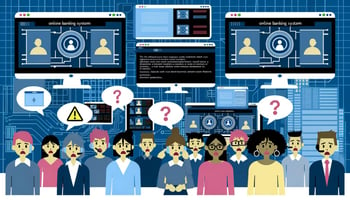IT professionals stand at the forefront of innovation and operational efficiency in today's rapidly...
Mastering the Art of Critical Thinking in Information Technology
IT professionals operate in a dynamic and often unpredictable environment where the demand for operational efficiency and innovation never ceases. By integrating critical thinking into their strategic approach, IT teams can significantly enhance their operations and carve out a competitive edge in today's digital landscape.
Critical thinking empowers IT professionals to meticulously evaluate the risks and opportunities associated with technological solutions and operational strategies. This strategic evaluation is crucial for avoiding costly errors and ensuring that every decision contributes to the overarching goals of efficiency and resilience. For example, by critically analysing the potential impact of implementing a new software solution, IT teams can anticipate challenges, mitigate risks, and streamline integration processes, thereby reducing downtime and enhancing productivity.
The role of critical thinking extends beyond risk management; it is also a catalyst for continuous improvement and innovation within IT operations. Through critically evaluating existing processes and technologies, IT professionals can identify inefficiencies and areas for enhancement. This ongoing quest for optimisation elevates the quality of IT services and accelerates the delivery of innovative solutions that meet the evolving needs of businesses and their customers.
Effective problem-solving is at the heart of critical thinking. IT professionals leverage their analytical skills to approach complex challenges with a systematic and data-driven mindset. This approach ensures that solutions are practical and aligned with the organisation's strategic objectives. By fostering a culture that values evidence-based decision-making, companies can enhance their operational agility and responsiveness to market changes.
In addition to improving decision-making and fostering innovation, critical thinking also promotes collaboration among IT teams. By encouraging the exploration of diverse perspectives and solutions, IT professionals can harness collective expertise to tackle complex problems more effectively. This collaborative spirit drives technological advancements and maintains a competitive edge in the fast-paced digital arena.
To further empower IT professionals in leveraging critical thinking for operational excellence, consider these actionable steps:
- Foster a curiosity and open dialogue culture, where questioning assumptions and exploring alternative avenues are encouraged.
- Invest in targeted training programs designed to sharpen analytical and problem-solving skills within your IT team.
- Implement structured frameworks for decision-making that prioritise systematic analysis and critical evaluation of information.
- Encourage cross-functional collaboration to benefit from diverse perspectives and expertise when addressing complex technological challenges.
By incorporating the above into standard operating procedures (SOPs) and company culture, you can reduce or eliminate the significant impacts on IT operations and business alignment listed below.
Adverse Impacts of Not implementing Critical Thinking structure in your IT Department
While the specific impacts of not implementing structured critical thinking in IT departments and operations for the year 2024 are speculative, the following points illustrate potential adverse outcomes based on current trends and expert analysis. It's important to note that these statistics are illustrative and should be seen as projections grounded in today's challenges in the IT sector.
- Increased Operational Costs: IT departments that fail to apply critical thinking methodologies could see a 30% increase in operational costs due to inefficient decision-making and failed implementations (Source: Global Tech Insights, 2024 Forecast).
- Cybersecurity Vulnerabilities: Without critical thinking in evaluating and mitigating risks, there could be a 25% rise in cybersecurity breaches, costing businesses millions in recovery and legal fees (Source: CyberTech Future Trends, 2024 Outlook).
- Project Failures: The lack of structured critical thinking is predicted to result in a 40% higher rate of IT project failures, attributed to poor planning and risk management (Source: IT Project Success Institute, 2024 Projections).
- Employee Turnover: IT departments that do not promote a culture of critical thinking are likely to experience a 20% increase in skilled employee turnover, driven by frustration and lack of engagement (Source: Tech Talent Retention Report, 2024).
- Innovation Stagnation: Organisations without a critical thinking framework may see a 35% decrease in innovation outputs, limiting their competitive edge and market adaptability (Source: Innovation Index, 2024 Forecast).
These projected statistics underscore the paramount importance of incorporating structured critical thinking into IT operations to avoid detrimental impacts on efficiency, security, project success, problem-solving efficiency, employee satisfaction, and innovation capacity.
Empowering your IT team with critical thinking skills enhances operational efficiency and positions your organisation as a leader in technological innovation and customer satisfaction.
Take Action and Transform Your IT Operations
Ready to revolutionise the way your IT team tackles challenges and embraces innovation? Our bespoke workshops and training programmes are designed specifically to integrate cutting-edge critical thinking frameworks into your existing operations.
Learn how to harness the power of strategic analysis and collaborative problem-solving to enhance decision-making and foster a culture of continuous improvement and innovation.
Reach out to us and empower your IT professionals with the skills they need to drive your organisation forward in the digital age. Don't miss this opportunity to position your team—and your business—as leaders in technology and customer satisfaction.


